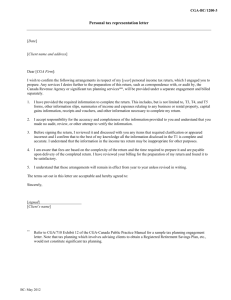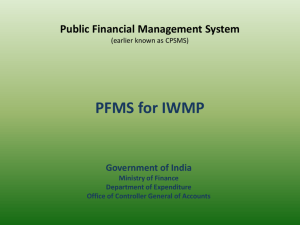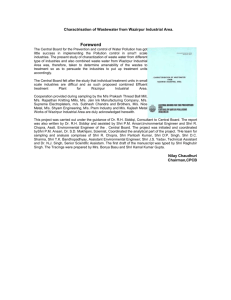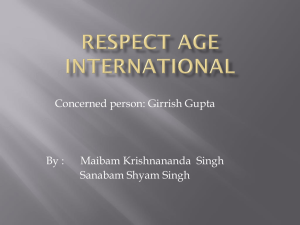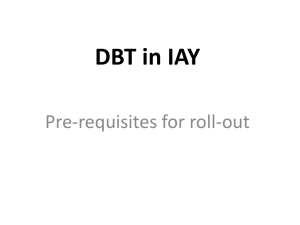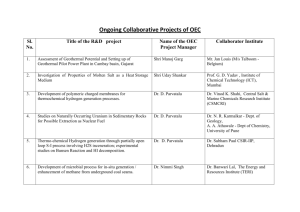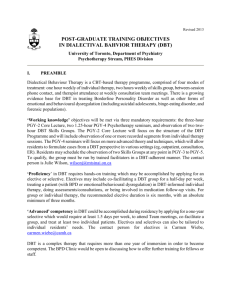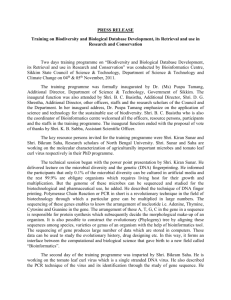Hon'ble President of India inaugurates Civil Accounts Day, 2016
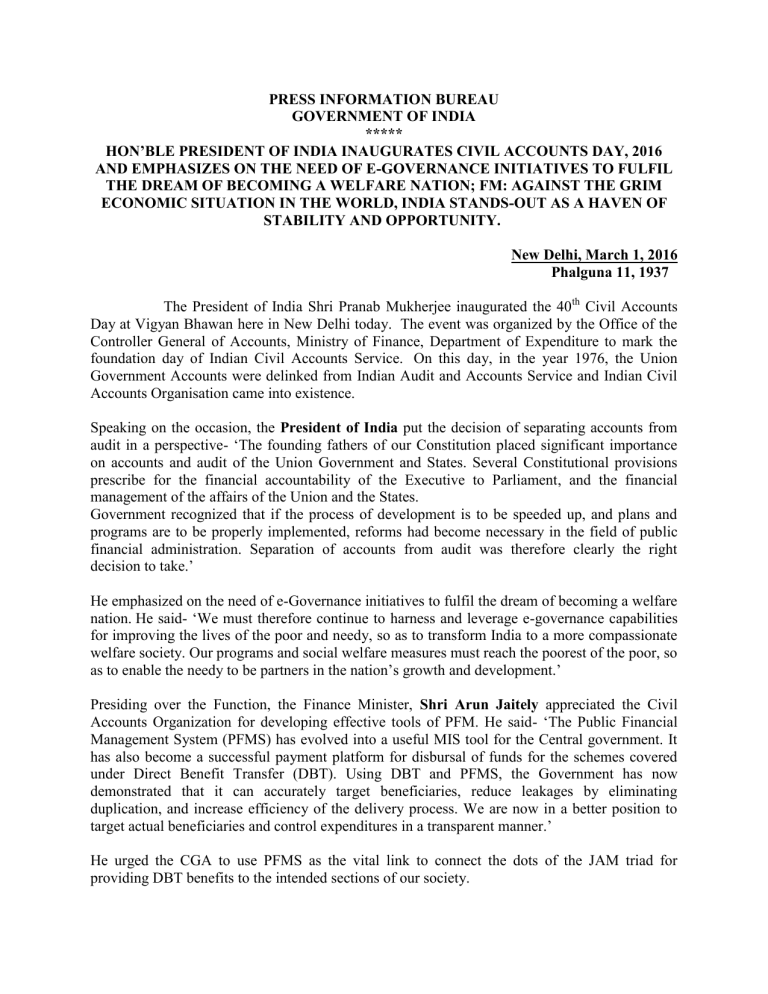
PRESS INFORMATION BUREAU
GOVERNMENT OF INDIA
*****
HON’BLE PRESIDENT OF INDIA INAUGURATES CIVIL ACCOUNTS DAY, 2016
AND EMPHASIZES ON THE NEED OF E-GOVERNANCE INITIATIVES TO FULFIL
THE DREAM OF BECOMING A WELFARE NATION; FM: AGAINST THE GRIM
ECONOMIC SITUATION IN THE WORLD, INDIA STANDS-OUT AS A HAVEN OF
STABILITY AND OPPORTUNITY.
New Delhi, March 1, 2016
Phalguna 11, 1937
The President of India Shri Pranab Mukherjee inaugurated the 40 th
Civil Accounts
Day at Vigyan Bhawan here in New Delhi today. The event was organized by the Office of the
Controller General of Accounts, Ministry of Finance, Department of Expenditure to mark the foundation day of Indian Civil Accounts Service. On this day, in the year 1976, the Union
Government Accounts were delinked from Indian Audit and Accounts Service and Indian Civil
Accounts Organisation came into existence.
Speaking on the occasion, the President of India put the decision of separating accounts from audit in a perspective- „The founding fathers of our Constitution placed significant importance on accounts and audit of the Union Government and States. Several Constitutional provisions prescribe for the financial accountability of the Executive to Parliament, and the financial management of the affairs of the Union and the States.
Government recognized that if the process of development is to be speeded up, and plans and programs are to be properly implemented, reforms had become necessary in the field of public financial administration. Separation of accounts from audit was therefore clearly the right decision to take.‟
He emphasized on the need of e-Governance initiatives to fulfil the dream of becoming a welfare nation. He said- „We must therefore continue to harness and leverage e-governance capabilities for improving the lives of the poor and needy, so as to transform India to a more compassionate welfare society. Our programs and social welfare measures must reach the poorest of the poor, so as to enable the needy to be partners in the nation‟s growth and development.‟
Presiding over the Function, the Finance Minister, Shri Arun Jaitely appreciated the Civil
Accounts Organization for developing effective tools of PFM. He said- „The Public Financial
Management System (PFMS) has evolved into a useful MIS tool for the Central government. It has also become a successful payment platform for disbursal of funds for the schemes covered under Direct Benefit Transfer (DBT). Using DBT and PFMS, the Government has now demonstrated that it can accurately target beneficiaries, reduce leakages by eliminating duplication, and increase efficiency of the delivery process. We are now in a better position to target actual beneficiaries and control expenditures in a transparent manner.‟
He urged the CGA to use PFMS as the vital link to connect the dots of the JAM triad for providing DBT benefits to the intended sections of our society.
FM stressed the need of major reforms in PEM to measure the outcomes. Highlighting it, he said- „CGA can play an important role towards improving public expenditure management by commissioning specific studies that evaluates and measures performance in implementation of national priority programs. Outputs and outcomes can be measured. What is measurable can be made accountable. Our objective is to learn from past experiences in the implementation of major projects and schemes, and rectify weaknesses through suitable modifications in the design of future projects.‟
The Finance Minister, Shri Arun Jaitely further said that the prevailing economic scenario across the world is challenging and this year‟s Budget was prepared and presented at a time of unusual volatility in the international economic market. Markets are fearful that the global recovery may be faltering. Against this grim background, India stands-out as a haven of stability and opportunity. Its macro-economy is stable, founded on the government‟s commitment of fiscal consolidation and low inflation. Its economic growth is amongst the highest in the world. These achievements are remarkable because they have been accomplished in the face of weak export demand and a second successive season of poor rainfall.
Finance Minister, Shri Arun Jaitely said that the task now is to sustain them in an even more difficult global environment. This will require sound economic management. Fiscal policy will continue to be vital in an uncertain global environment, while sustaining growth. On the
Government‟s “reforms-to-transform” agenda, a series of measures have been enacted which should increase the supply potential of the economy. We want to create wealth and spread that wealth across the economy especially to farmers, the vulnerable and disadvantaged groups. Sabka Saath Sabka Vikas is our guiding philosophy which we will strive to meet every day.
The Comptroller & Auditor General of India, Sh. Shashi Kant Sharma briefly touched the background in which accounts were separated from the audit.
He underlined the provisions of FRBM Act to shape the paths for some more important disclosures. He said-„Under the Fiscal Responsibility and Budget Management Act, there is disclosure on what revenues the government has to realize and the revenue which is due but not realized. Similarly, I feel there should be proper disclosure of what the government owes in terms of unpaid claims for goods and services already supplied or consumed by it. Similarly, improving the system of asset accounting continues to be part of the unfinished agenda as it is also an important ingredient of the government‟s obligations under the Fiscal Responsibility and
Budget Management Act.‟
C&AG informed the gathering about the big data centre established in his office. Referring to the challenges in dealing with big data Mr. Sharma said- „The potential of using the mass digital data generated in the process of compilation and consolidation of government accounts is huge. We have initiated steps to deal with the challenges posed by big data. One of the biggest databases that would merit the application of advance data analytics tools is the data on government accounts from the transaction level to the highly aggregated accounts presented to the
Parliament.‟
Tracing the outcomes of departmentalized accounts The Finance Secretary, Shri Ratan P.
Watal said- „The management accounting function is now well entrenched in the Executive.
Line Ministries and Departments today take complete responsibility for their spending decisions, and the resultant outputs and outcomes of budget allocations voted by Parliament. Prescribed timelines for closure of monthly and annual accounts are complied with.‟
Mr. Watal acknowledged the role of PFMS in DBT and said- „I must specifically mention the role played by the Public Financial Management System (PFMS) in facilitating timely payments to the poor and needy people of our country in respect of social sector schemes administered through the DBT mode. PFMS has become a game changer and has led to significant efficiency gains for the Government. It is for this reason that Government intends to further strengthen the capacities and capabilities of PFMS and transform it to an Integrated Financial Management
Information System.‟
The Controller General of Accounts, Shri Mohan J. Joseph , while welcoming the President of
India and other guests highlighted the major initiatives and achievements of the Civil Accounts
Organisation in the 40 years of its existence. Assuring all the stakeholders of continuous reforms
Mr. Joseph said-„Reforms in public financial management are a continuous process. From time to time, structural changes take place in the economy, as well as in the functioning of the government which demand accounting data on public finances to be available to decision makers, often on real time basis. This demand for faster information can only be met through adoption of technology in the banking sector, since banks play a pivotal role in the treasury operations. Recognizing this need, the Service has since its inception, been a pioneer in the use of Information Technology in payments, Accounting and Financial Reporting.‟
Later, many officers of the CGA were awarded for their outstanding performances by the
Hon‟ble President of India.
